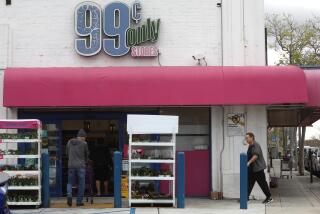A Green Thumb
- Share via
They boldly go where most financiers fear to tread: the world of retail.
From restaurant chains to drugstore giants and most recently a group of nearly 300 home-improvement stores, Leonard Green and his partners delight in rescuing the “dogs” of the retail industry. Green breathes new life into troubled companies--sometimes with mixed results--and in doing so reaps returns for his investors.
For the record:
12:00 a.m. July 25, 1997 For the Record
Los Angeles Times Friday July 25, 1997 Home Edition Business Part D Page 3 Financial Desk 1 inches; 34 words Type of Material: Correction
Thrifty purchase--The Los Angeles buyout fund Leonard Green & Partners purchased the Thrifty Drug Store chain from Pacific Enterprises, the parent of Southern California Gas Co. The seller was incorrectly identified in a story on Thursday.
“Our approach is building, not destroying,” said Green, 63, a Philadelphia native who started his Los Angeles buyout firm Leonard Green & Partners in 1989 after decades of industry experience.
Now he and his team of partners, none older than 41, face what could be their toughest challenge yet.
Last week, Green purchased Hechinger Co., a Largo, Md.-based home-improvement chain, for about $500 million. Combining it with Builders Square, a troubled San Antonio home-improvement chain owned by Kmart Corp., Green and his partners will create the nation’s third-largest home-improvement company, with $4.5 billion in sales and 279 stores. Once the merger is complete, Kmart will have an option to buy a minority interest.
This combination of retail chain and construction-related industry couldn’t be more fitting for Green, known for improving the firms he owns and building from bottom up, rather than breaking up companies and selling the pieces. Retail is also a comfortable place for Green. His father was a dress company salesman and other family members worked in the garment industry.
Most investors avoid the out-of-favor retail industry, which continues to struggle. Lackluster consumer spending and high consumer debt levels have hurt this industry nationwide. A widening gap between the strongest and weakest retail firms means more companies will go out of business or consolidate to survive.
Green and his partners have shown an uncanny knack for finding opportunity in these troubled companies. With his new home-improvement chain, Green hopes to mirror the success he and his partners had in the early 1990s in their purchase of Thrifty Drug Stores from the parent of Southern California Edison Co. After being merged with PayLess Drug and purchased by another company, Thrifty has now provided investors a compounded annual 118% return on their initial $37 million investment in the drugstore chain, he said.
What’s the strategy once Hechinger and Builders Square are merged? Green and company usually prefer to back existing management, but in this case they have brought in Anthony Petrillo, the same corporate consultant who advised them on the Thrifty-PayLess merger, to run the new home-improvement chain.
The focus will be back to basics: Improving the layout and look of the stores and the merchandise are top priorities. After some layoffs and a decision about whether to call the new firm Hechinger or Builders Square or something else, the company will begin expanding, said Jonathan D. Sokoloff, 39, a partner at the firm.
That will probably mean new stores in Southern California, where neither chain currently has a presence, Green said. “We want to make what we have better first,” Sokoloff said. “And then we’ll grow it.”
In fact, analysts are already predicting that eventually Hechinger and Builders Square may be combined with Irvine-based HomeBase, which has 84 stores, more than half of which are in California. Currently a subsidiary of Waban Inc. in Natick, Mass., HomeBase is expected to be spun off into a public company in the next few months. Originally Green and his partners had tried to merge Builders Square with HomeBase, but Waban pulled out of the deal, Green said.
Still, even that combination may have trouble competing against industry leader Home Depot, with more than 500 stores nationwide and about double the sales of its next competitor, Lowe’s Cos., based in North Carolina.
“Home Depot is doing very, very well and making it tough for all competitors,” said Bruce Thorp, an analyst with PNC Institutional Investors Services in Philadelphia who follows the home-improvement industry. “So the question is what Leonard Green can do to bring customers back into the stores. They have a reputation for working miracles, and that’s what they will have to do here.”
Aram Rubinson, an analyst with PaineWebber Inc., was even more skeptical.
“There are some companies that just need to go away, not combine,” he said. “I don’t have much hope here.”
Still, these days Green says he thinks of himself as more of a seller than buyer. This year he has sold investments in Thrifty, grocery chain Kash ‘N Karry Food Stores Inc. and vitamin maker Twinlab Corp. either to corporate buyers or to the public via stock offerings. As the stock market continues to climb to record highs, Green and his partners are making profits by selling stakes.
“Once you achieve a certain value for your investors, don’t be a pig about it,” Green said.
Since 1990, Green’s investment bets have averaged an annual compound return of 81% for investors such as CALPERS, the California Public Employees Retirement System, the Pennsylvania state teachers pension fund, Wells Fargo & Co. and Citicorp. A small percentage of his investors, about 5%, are high net worth individuals, he said.
“He’s made a lot of money in retail and not a lot of people have,” said Kenneth Moelis, a managing director with Donaldson Lufkin & Jenrette in Los Angeles, who cited Green’s good instincts and his persistence. Some of his deals are five years or more in the making.
Now, Green is beginning to raise investor funds for the firm’s newest in a series of leveraged buyout funds. While the last fund raised about $300 million from investors, this newest pool, called Green Equity Investors III, will be “substantially larger,” with a size of $600 million or more a possibility, Green said.
Green’s partners like to think of themselves as “cautious contrarians,” said John Danhakl, 41, and are continuing to be approached with lucrative opportunities in retail, electronics and other sectors. Because of increased business, Green is hiring more partners and recently hired Peter J. Nolan, 39, a former investment banker with DLJ.
“We’re finding a lot of private companies looking for partial exit strategies, where they want to sell a small stake but keep some chips on the table, by owning a third or a quarter of the business,” Sokoloff said.
Green has had some notable successes, including an investment in an Australian gold mine, but has also seen some notable failures, including a 17% stake in 1994 in Irvine-based Family Restaurants Inc., which owns El Torito. That has posted a negative 28% return as of June 30.
“It’s a very, very tough industry,” Danhakl said. “The Mexican restaurant industry has been very tough as it’s gotten more popular and everyone is offering it.”
While some might say Green operates a “vulture fund” because he invests in such distressed companies, he bristles at the term, saying simply, “hostile takeovers--that’s not what we’re about as a firm.”
Instead, Green prefers a word like “knight.”
Sitting in his 20th-floor conference room in front of “Troops on Parade,” an 1890 oil painting of a group of brightly helmeted soldiers on horseback, Green often uses phrases such as “white knight” and “knight in shining armor” to describe what he does.
That may be why he still feels a little misunderstood about his investment in Thrifty.
After Green bought Thrifty, the firm acquired rival PayLess from Kmart Corp. Once the company was merged with PayLess, Thrifty moved its headquarters from Los Angeles, where it had been for 75 years, to Oregon.
At the time, Green criticized Los Angeles Mayor Richard Riordan for not doing enough to keep Thrifty in Los Angeles. The two have not spoken since, Green said.
“We saved thousands of jobs,” said Green, pointing to Woolworth Corp.’s recent retrenchment as something that could have happened to Thrifty. “There was nothing we had done other than help that company and the overall economy, including Southern California.”
Green said he is committed to Southern California.
Earlier this year, Green and his wife, Jude, bought a Bel-Air home for about $6 million from Rick Rosenfield, co-founder of the California Pizza Kitchen chain and his wife, Esther. The Greens sold their Beverly Hills home, with eight bedrooms and nine bathrooms, to Neil Diamond for $4.7 million.
(BEGIN TEXT OF INFOBOX / INFOGRAPHIC)
Leonard Green Investments
*--*
Equity Annual Date investment, rate acquired Company in millions of return Realized Investments, Stakes Sold by LGP Oct. ’90 Carr-Gottstein Foods $14.4 16.8% Aug. ’91 Almac’s Supermarkets 19.6 N/A Nov. ’91 Kash ‘N Karry Food Stores 45.0 --6.8 May ’92 Australian Resources 15.5 203.4 Sept. ’92 MC Sports 0.8 113.8 Sept. ’92 Thrifty PayLess 37.0 118.7 Publicly Traded Oct. ’90 Carr-Gottstein Foods $14.5 0.3% May ’96 Twinlab 4.8 3,216.4 Privately Held by Green Equity Investors L.P. Sept. ’92 Big 5 Sporting Goods $28.5 17.0% Sept. ’92 Gart Bros. Sports 3.3 79.9 Jan. ’94 Family Restaurants 28.8 --26.6 April ’95 Arrow Group Industries 8.6 0.0 Privately Held by Green Equity Investors II Apr. ’95 Arrow Group Industries $15.3 0.0% Aug. ’95 Communications & Power 15.4 38.2 June ’97 Leslie’s Poolmart 15.3 N/A June ’97 Wavetek 13.5 N/A 14 investments by LPG 290.3 81.0
*--*
Source: Leonard Green & Partners L.P.
More to Read
Inside the business of entertainment
The Wide Shot brings you news, analysis and insights on everything from streaming wars to production — and what it all means for the future.
You may occasionally receive promotional content from the Los Angeles Times.










